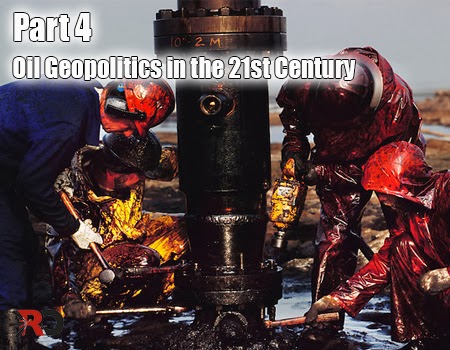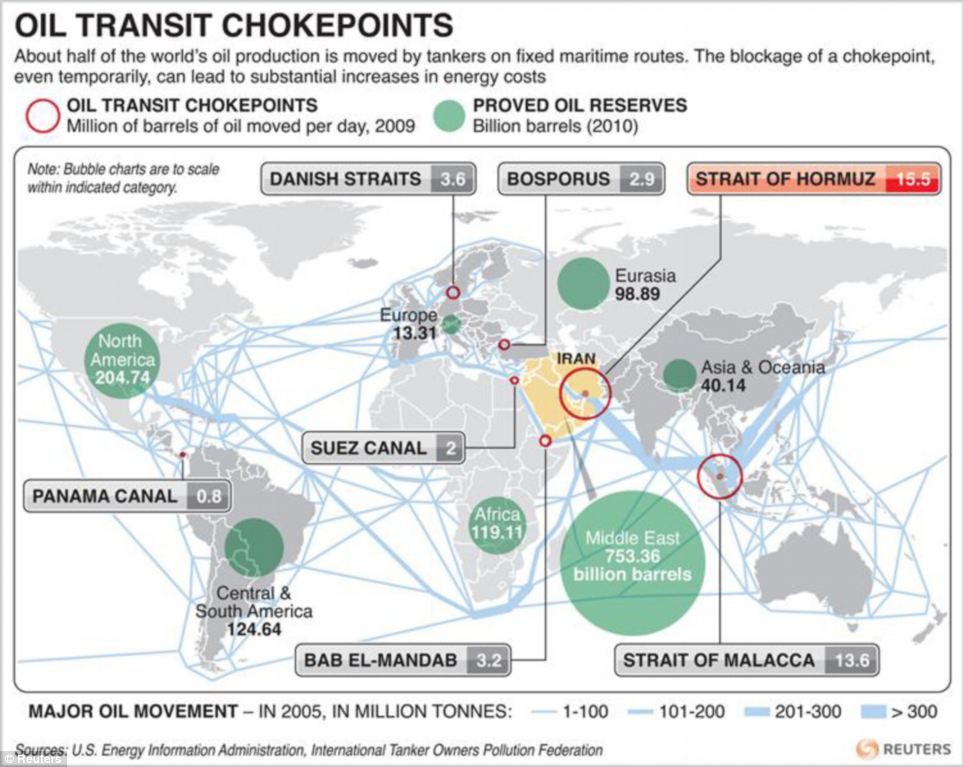In this final instalment on the geopolitical importance of the oil industry, Idries Devries looks at the geopolitics of oil in the modern era and the recent development in Shale energy.
Today, a common misconception is that wars are fought over oil because huge profits can be made in the oil business. Some people believe, therefore, that oil companies push their governments to engage in geopolitics using all means, including war, to secure for themselves these profits.
This view grossly underestimates the importance of oil, however. The economies of the world today are all totally dependent on energy. Since most of the energy produced comes from oil and gas, it can be said that oil and gas are the lifeline of the world economy as we know it. If for any country this lifeline would is cut, it would have disastrous consequences for the inhabitants of that country. Transportation would come to halt, so markets would no longer be supplied. Factories would grind to a halt, inventories would quickly run out. Complete chaos would ensue.
When it comes to geopolitics, therefore, the primary objective of governments is to secure a steady and reliable supply of oil and gas. Indeed, no country would pass on the opportunity of having national companies manage that supply since immense profits can be made this way. But if the engagement of a national oil company could threaten the security of the supply, this objective would quickly be discarded. Realizing the profit potential in the oil business is therefore only a secondary objective behind security of supply.
For as far as the countries with global interests are concerned, they have a further ambition which is to control the supply of oil globally. “Who controls the food supply controls the people; who controls the energy can control whole continents; who controls money can control the world”, Henry Kissinger is reported to have said.
In the past, Western countries used colonialism to achieve all three of their objectives (secure supply, control oil flows, control oil production) at once. Britain made Iran an effective colony, after which British companies produced the oil there and transported it back home for usage by the British Navy. When America began promoting “national independence” to weaken the British position globally, the policy of the Western colonialist countries changed slightly, from direct military colonization to the agency-model where the colonialist establishes an obedient local as a ruler. This affected the oil policy of the colonialist countries. To be able to maintain the agent in his position, public support for the agent became a matter of importance. Consequently, a façade of independent decision making on the part of the leaders of the colonized countries had to be ensured before the oil of the colony could be exploited. Usually this was done by having the oil companies from the colonialist countries sign formal agreements with the agents in the colonized countries, such as the Americans did in Saudi Arabia. Due to the increase in awareness and hence power of the general public in the Muslim world, over time these deals between the agent rulers and the oil companies from the colonialist countries have had to be made ever more advantageous for the colonized countries, to the detriment of the oil companies. But since the primary objective of the colonialist countries is securing supply, this is not seen as a big problem by the colonialists. Also, of course, because they know that through their agents they can ensure that the colonized will spend their newfound wealth in the colonizers country.
In response to this development, under George W Bush America decided to focus on ensuring that its military controlled the transport routes of oil. So the Americans have ensured it operates military bases around the world from which it can control these transport routes or at a minimum “exercise power” over these routes, rather than focus on control of the oil wells themselves. [1] It has also ensured that the international military alliance NATO supports the American objective to control the flow of oil. In 2008 at the Bucharest Summit, NATO members agreed that part of NATO’s role in the world is “supporting the protection of critical infrastructure”. [2]
The major choke points when it comes to the transport of oil and gas have therefore become the scene of geopolitical conflict: [3]
-
In the Arabian Gulf and the Strait of Hormuz a conflict between Iran and the Gulf countries was created to enable a continued American presence in the region.
-
Yemen and Somalia have been thrown into chaos because the Bab al Mandab and the Gulf of Aden are critical for the westward traffic of oil from the Gulf region.
-
In Egypt Abdul Nasser fought against the British-imposed King Farouk and the Muslim Brotherhood to first establish and then maintain American dominance; and today America works against popular aspirations; all in part because of the importance of the Suez Canal.
-
In the Indian Ocean, America and Britain were in conflict over Sri Lanka because it lies on the major transport route for eastward traffic from the Gulf.
-
The South China Sea is slowly but steadily becoming an area of conflict between China and America’s agents in South East Asia, not just because the area could possess large amounts of oil and gas but also because it is of critical importance for the transport of oil and gas to China, Korea and Japan.
-
Through Erdogan the Americans challenged the long standing ties between the Turkish (military) establishment and Great-Britain, in part at least because the Turkish Straits are critical for the transport of oil from Caspian Sea.
-
In Georgia Russia engaged the American agent-government militarily, in part because of the importance of the Baku-Tbilisi-Ceyhan pipeline that transports Caspian oil to the Mediterranean.
-
The Urengoy–Pomary–Uzhgorod pipeline (West-Siberian pipeline or the Trans-Siberian pipeline) lies at the heart of the conflict between Europe and Russia in Ukraine, which shows itself in the Ukrainian political arena.
“fracking”
It is often thought that oil production is about tapping into pools, lakes or even seas of oil deep below the surface of specific places on earth. In reality, however, this is not the case. Crude oil exists inside porous rock formations and the standard oil production technique is to drill a hole into these rock formations to allow the natural pressures deep inside the earth to push the oil flow towards and through the hole to the surface.
In certain parts of the world, oil and gas are trapped in very dense rock formations (“tight oil”). Due to the density of these rock formations it is impossible for oil to flow. Drilling a hole into these rock formations to tap the oil will therefore not produce any meaningful quantities.
This issue has been resolved through an oil production technique called hydraulic fracturing, commonly known as “fracking”. Under fracking a mixture of water and chemicals is injected into the dense rock formation to cause hairline fractures. The chemicals in the water are intended to prevent these fractures from closing, such that the oil can start flowing in the direction of the well and from there onto the surface.
Fracking has substantially increased American oil and gas production ever since it was introduced on a large scale about 5 years ago. It has increased American oil production 30%, from 5 million barrels per day in 2008 to 6.5 million barrels per day in 2012. This has led the American Energy Information Administration (EIA) to conclude that “under certain conditions” America could become energy independent or even a net exporter of energy by 2040, which would significantly alter the state of geopolitics. [4]
It is very unlikely, however, that the “certain conditions” the EIA is referring to will ever come into existence. One of the major challenges that will need to be overcome is very high depletion rates of fracking wells. The average fracking well in the US produces 600 barrels per day with an annual decline rate of around 40%, meaning that after one year the same average well produces just 360 barrels per day. Just to keep production flat, therefore, a very large number of new wells need to be drilled every year. This is what makes the production of oil from dense rock formations very expensive. [5]
Another major challenge for the fracking industry is water usage. Fracking requires the injection of large quantities of water. Most of this water gets lost in the dense rock formation. The portion of it that comes back to the surface with the oil (and gas) is heavily polluted by the chemicals that are mixed into it as well as by the oil and gas it interacts with below the surface. Although America is very rich in water eventually there will arise competition for water between fracking, consumption and other industries such as agriculture. (In other parts of the world the water needs of fracking will prevent the exploitation of the tight oil. China, for example, has very large oil reserves in such rock formations, but essentially all of them are in areas where water is very scarce.)
The implication of this is that while fracking might have a lasting effect on the energy balance in some countries, it will not do so in a way that will turn the energy balance for this country upside down. [6] This applies even more to the global energy balance, meaning that the geopolitical impact of fracking will most likely remain limited.
Part 1 – The origins of the oil industry.
Part 2 – The emergence of oil as a strategic commodity.
part 3 – Oil and war
[1] “US military on the scent of oil”, Colonel Daniel Smith, www.atimes.com/atimes/Front_Page/FK20Aa01.html
[3] “World Oil Transit Chokepoints”, www.eia.gov/countries/regions-topics.cfm?fips=wotc&trk=p3
[4] “Annual Energy Outlook 2013”, www.eia.gov/forecasts/aeo/pdf/0383%282013%29.pdf
[5] “Why Americas shale oil boom could end sooner than you think”, www.forbes.com/sites/christopherhelman/2013/06/13/why-americas-shale-oil-boom-could-end-sooner-than-you-think/
[6] “Scientists Wary of Shale Oil and Gas as U.S. Energy Salvation”, www.sciencedaily.com/releases/2013/10/131028141516.htm
[6] “Scientists Wary of Shale Oil and Gas as U.S. Energy Salvation”, www.sciencedaily.com/releases/2013/10/131028141516.htm






